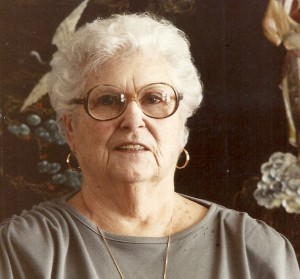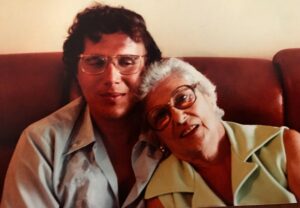My maternal grandmother was British. Born in the Shoreditch area of London, Fay came to Canada in her teens; she maintained her British accent until her death.
All my friends called their grandmothers by the name Grandma or Buba (Yiddish) , but I called my grandmother Nana Fay.
Fay lived in Montreal for over 85 years and never learnt one word of French. And it’s not that she did not try. “I have a tin ear (eyah) for languages”, she claimed. However, once I dropped by a toy shop where she was working as a sales clerk. “Touchez-pas” she was saying to a few kids who were feeling out the merchandise. For years and years after, I used to ask her what does “touchez pas” mean in English, and we would both laugh.
Fay was also a dental assistant for Dr Vosberg. Then she owned a dress shop named “Moleen’s” on Queen Mary Road in Montreal. A massive theft shut Moleens’s down and my grandmother was heartbroken and financially busted. But she survived.
I heard my father say once that his mother-in-law Fay was a “tough old bird”. I asked Nana Fay if she considered herself as such and she said, “I guess you can say so, but not as far (fah) as you are concerned”.
As she got older, Nana Fay had a craving for sugar and it was a family chore to make sure that she did not have access to chocolate because of her diabetes. I used to smuggle her cubes of chocolate and Nana Fay used to say “this is just OUR little secret, isn’t it boychik”. I was about 10 years old at the time.
This was not the only secret I had with my grandmother. When I was studying at McGill, I dropped by my grandmothers for “tea”. After she poured me the tea and gave me some of her home made cookies , she said “if you ever smoke pot, or whatever it’s called, I wouldn’t mind trying the stuff myself.” And so we did. Another little secret.
Nana Fay and I joked a lot. I used to ask her how to convert Canadian dollars into British currency and she would go through a long explanation, doing calculations in her head and getting it all wrong….”did you say 2 dollars into pounds or 2 pounds into dollars”?
My grandfather who trained his famous boxer-brother was also a Brit. He died when I was young.
Thereafter, my grandmother remarried. Her second husband was divorced so married in the States to avoid any hassle with the then very conservative Quebec government. Quebec did not recognize “divorced status”. At her wedding, Nana Fay took me aside and, like a character from a John Irving novel, told me, “I certainly did not attend my grandmother’s wedding. You are a lucky boychik, you are”.
She read me lots of children’s stories from the old country, and our favourite poem was “Albert and the Lion”, which she must have read me two thousand times. So, for those who ask me where the Ramsbottom name comes from in my satiric Gloria blog…….
I left for Israel in 1970. Before my departure Nana Fay told me that “I left England as a young girl and broke my parents hearts God bless them, so who am I to tell you how to live your life, boychik”.
My grandmother had a stiff upper lip and demanded it from me. Fay loved gardening; so do I. Fay was a real character. I appear to be one as well.
We loved each other very much, stiff upper lip and all.




